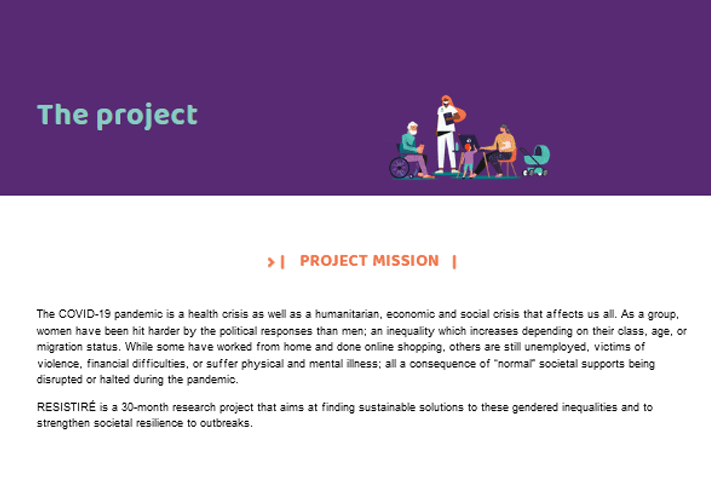
| Short descriptor of good practice |
| The RESISTIRÉ project has developed a game based on postcards, to raise awareness among different groups (older people, professionals in the care sector, people in charge of safeguarding rights, young students) on the human rights of older people, how to access support, and how to prevent situations like those observed during the pandemic from happening in the future, even in the absence of crises. |
| Type of setting where good practice is delivered |
| Activities were implemented by an NGO and it can be done in any type of setting. How does it work? Each postcard has two sides: 1. The front side presents an emotion together with an image and the question “Who am I?”. This is intended to spark the discussion, where players can engage in guesswork. 2. The back side contains a narrative that describes a particular experience associated with the clues provided in the front side of the card. This is followed by a list of facts leading to the violation of the rights and freedoms of older people during the Covid-19 pandemic. Drawing on this information, this second part of this game consists in: – discussing the specific rights and freedoms being breached in relation to the particular case being presented, based on information provided in a QR code inserted in the back side of the card; – discussing how this situation could be prevented in the future. The QR code displayed at the back of the card links to more information on the rights of older people as well as recommendations provided by the RESISTIRÉ project team, including examples of solutions relating to the specific personal situations introduced in the cards. |
| Time Frame for delivery of good practice |
| The “Right(s) now!” game cards can be printed out by anyone and can be used, for example, for a discussion in a nursing home, as a side activity of a senior activity, or as a resource in an educational context. The game can be further developed to be adapted for use in different contexts and for different target groups e.g., in the training of the police, social workers, nurses, help-carers, etc. 12 cards are available as in a PDF document that can be easily printed in A4 format. Simply fold/cut them in two and glue both sides to start using them! |
| Type of learner the best practice is supporting |
| Older people, professionals in the care sector, people in charge of safeguarding rights, young students |
| Resources used as part of good practice |
| These cards are based on the observation that older people are not sufficiently aware of their rights, as well as those who feel responsible for protecting them. https://resistire-project.eu/wp-content/uploads/2023/08/RESISTIRE-Flashcards-compressed.pdf |
| Aims and objectives of good practice |
| Project aims at finding sustainable solutions to gendered and generational inequalities and to strengthen societal resilience to outbreaks. |
| Evidence as to why this was considered good practice |
| RESISTIRÉ collected promising practices in 31 European countries (in the EU27, Iceland, Serbia, Turkey, and in the UK) which alleviate the impact of COVID-19 policies on inequalities. |
| 3 Key learning Principles that were used in this good practice to support senior learners |
| 1. Interactive and gamified learning 2. Relevance to real-world situations 3. Practical application and discussion |
| Any additional learning that we can take from this good practice example |
| By providing in-depth knowledge of the negative impacts of COVID-19 policies on inequalities and involving stakeholders in the co-creation of policy solutions, RESISTIRÉ had five main impacts: 1. Ensured that policymakers consider the potential impact on inequalities of health policies; 2. Gave visibility to the negative effects of COVID-19 policies on inequalities and vulnerable groups; 3. Empowered policymakers to take the right measures to mitigate the negative effects; 4. Stimulated civil society initiatives and citizens participation to support vulnerable groups; 5. Developed new concepts for bottom-up initiatives and inspire policymakers and stakeholders to uptake them. |
| Any Additional Information |
| https://resistire-project.eu/the-project/ |
